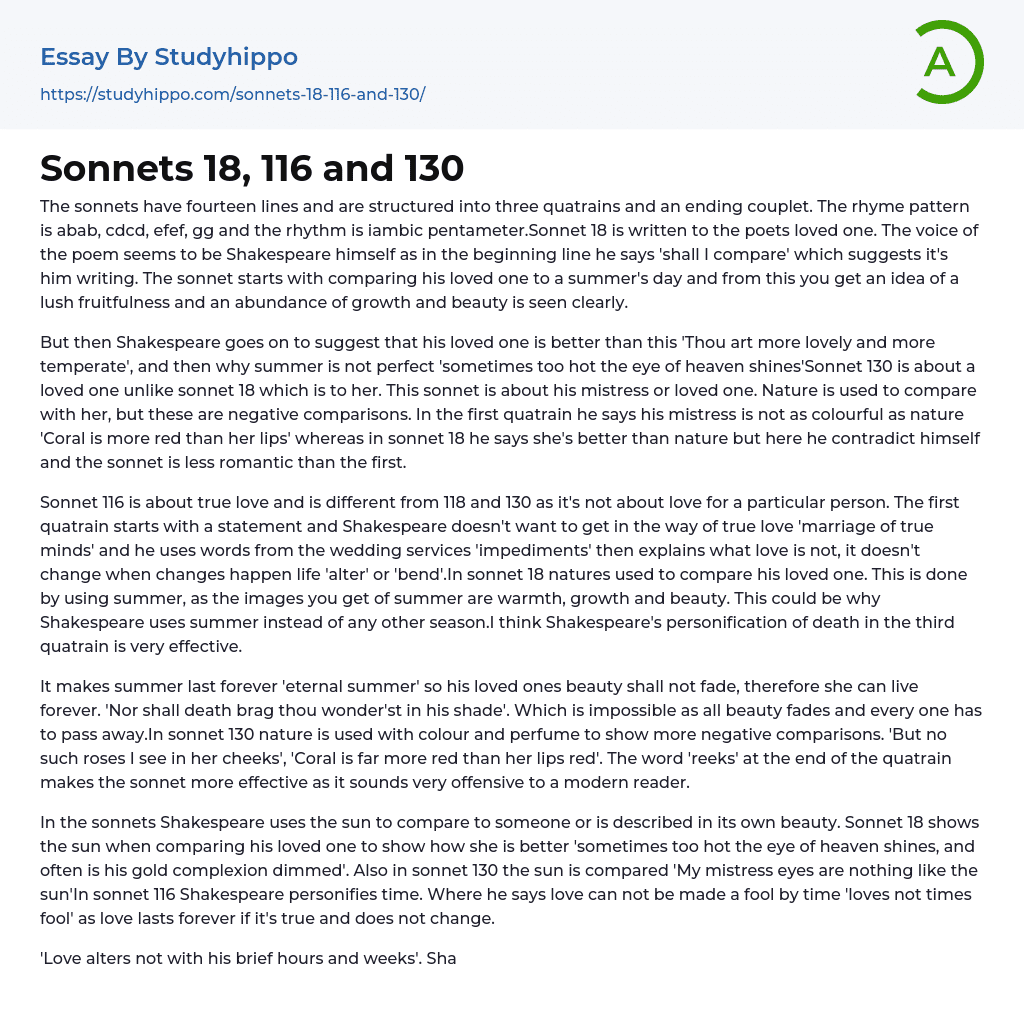The sonnets have fourteen lines and are structured into three quatrains and an ending couplet. The rhyme pattern is abab, cdcd, efef, gg and the rhythm is iambic pentameter.Sonnet 18 is written to the poets loved one. The voice of the poem seems to be Shakespeare himself as in the beginning line he says 'shall I compare' which suggests it's him writing. The sonnet starts with comparing his loved one to a summer's day and from this you get an idea of a lush fruitfulness and an abundance of growth and beauty is seen clearly.
But then Shakespeare goes on to suggest that his loved one is better than this 'Thou art more lovely and more temperate', and then why summer is not perfect 'sometimes too hot the eye of heaven shines'Sonnet 130 is about a love
...d one unlike sonnet 18 which is to her. This sonnet is about his mistress or loved one. Nature is used to compare with her, but these are negative comparisons. In the first quatrain he says his mistress is not as colourful as nature 'Coral is more red than her lips' whereas in sonnet 18 he says she's better than nature but here he contradict himself and the sonnet is less romantic than the first.
Sonnet 116 is about true love and is different from 118 and 130 as it's not about love for a particular person. The first quatrain starts with a statement and Shakespeare doesn't want to get in the way of true love 'marriage of true minds' and he uses words from the wedding services 'impediments' then explains what love is not, it doesn't change when changes
happen life 'alter' or 'bend'.In sonnet 18 natures used to compare his loved one. This is done by using summer, as the images you get of summer are warmth, growth and beauty. This could be why Shakespeare uses summer instead of any other season.I think Shakespeare's personification of death in the third quatrain is very effective.
It makes summer last forever 'eternal summer' so his loved ones beauty shall not fade, therefore she can live forever. 'Nor shall death brag thou wonder'st in his shade'. Which is impossible as all beauty fades and every one has to pass away.In sonnet 130 nature is used with colour and perfume to show more negative comparisons. 'But no such roses I see in her cheeks', 'Coral is far more red than her lips red'. The word 'reeks' at the end of the quatrain makes the sonnet more effective as it sounds very offensive to a modern reader.
In the sonnets Shakespeare uses the sun to compare to someone or is described in its own beauty. Sonnet 18 shows the sun when comparing his loved one to show how she is better 'sometimes too hot the eye of heaven shines, and often is his gold complexion dimmed'. Also in sonnet 130 the sun is compared 'My mistress eyes are nothing like the sun'In sonnet 116 Shakespeare personifies time. Where he says love can not be made a fool by time 'loves not times fool' as love lasts forever if it's true and does not change.
'Love alters not with his brief hours and weeks'. Shakespeare is so sure he is right about true love that in the ending couplet he
says if he is wrong he has never written any thing and no man has ever loved. 'If this be error and upon me proved, I never writ, nor no man ever loved'. This also makes the poem very effective as he is willing to doubt his own writing to prove he is right. The language of the poem is complex and uses more imagery.
It becomes simpler in the couplet, to try to seem sincere. As in the other sonnets, the natural world the weather and time are used to help convoy his ideas.I think sonnet 130 is more effective as Shakespeare gives you the sights, sounds and smells of his loved one through his rich use of language and imagery. Even though the poem seems very negative and the word 'reeks' helps to influence this, Shakespeare explains himself in the ending couplet as he says his love is more special 'rare' than those who make false comparisons to show love.
He loves his real woman and this makes the sonnet more effective than 18 and 116.
- Boo Radley essays
- Genesis essays
- Richard iii essays
- Alice in Wonderland essays
- On the road essays
- Ozymandias essays
- The Nightingale essays
- Holden Caulfield essays
- Animal Farm essays
- 1984 essays
- A Hanging essays
- Shooting An Elephant essays
- A Tale Of Two Cities essays
- Adventures Of Huckleberry Finn essays
- Arthur Conan Doyle essays
- Brave New World essays
- Characters In Hamlet essays
- Characters In Romeo And Juliet essays
- Desdemona essays
- Diary Of A Wimpy Kid essays
- First-Person Narrative essays
- Frankenstein essays
- Heart Of Darkness essays
- Jane Eyre essays
- Jay Gatsby essays
- King Duncan essays
- Librarian essays
- Little Red Riding Hood essays
- Lord Of The Flies essays
- Silas Marner essays
- The Cask Of Amontillado essays
- The Catcher In The Rye essays
- The Crucible essays
- The Handmaid's Tale essays
- The Reader essays
- Virgil essays
- Wuthering Heights essays
- Candide essays
- Castle essays
- J. D. Salinger essays
- Ulysses essays
- Ethan Frome essays
- In Cold Blood essays
- Outliers essays
- Tuesdays With Morrie essays
- The Art of War essays
- Wife of Bath essays
- Huckleberry Finn essays
- The Lady With The Dog essays
- Great Expectations essays




